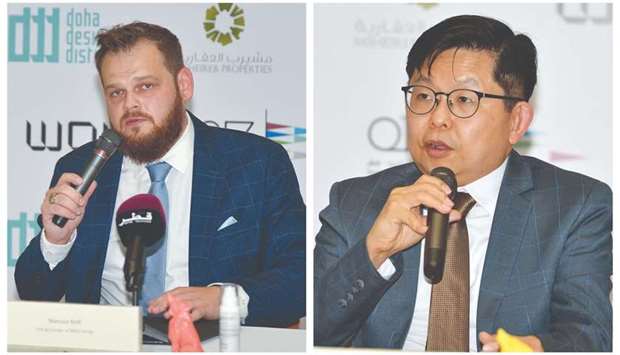3D printing technology will help serve as a vital enabler for innovative entrepreneurs in the country to promote the ‘Made in Qatar’ brand, according to an official of Qatar Free Zone Authority (QFZA).
“In Qatar, I know there is a budding group of entrepreneurs who are very good in the design of various consumer and industrial products. I believe this is a trend, but you need enablers and support,” QFZA CEO Lim Meng Hui told Gulf Times on the sidelines of a signing ceremony held recently between QFZA, WOLF Group, and Msheireb Properties.
According to Hui, the presence of WOLF Group in Qatar would help enable and provide entrepreneurs “an excellent opportunity” to create new cultural, consumer, or industrial products that carry the ‘Made in Qatar’ brand.
WOLF Group CEO & founder Mariusz Krol emphasised that Qatar “is ready and open for new technology.”
“We are looking forward to partner with Qatar in this endeavour and use our technology to build together for the future and to meet the country’s objectives. One of the thrusts of our mission is to build awareness among children and to have a strong focus on education, which is very important for our company,” Krol also told this newspaper.
Earlier, Hui, Krol, and Msheireb Properties acting CEO Ali al-Kuwari signed agreement to establish a 3D printing and digitalisation hub, as well as an art gallery in Ras Bufontas Free Zone with its headquarters to be located in Doha Design District at Msheireb Downtown Doha.
The 3D printing and digitalisation hub will offer access for artists and enterprises to next-generation technologies, such as 3D printing and innovative new techniques for scanning and photogrammetry.
WOLF Group will facilitate the transfer of artists’ works from digital versions to real works of art using various resources, including recycled materials, thus helping raise awareness of sustainable development methods. The hub will be a place where designers and the general public can gather, create, and be inspired.
The partnership will also enhance Doha’s position as a regional design hub. The collaboration supports Qatar National Vision 2030 to drive sustainable development and achieve a balance between the country’s growth needs and protecting the environment.
Hui said, “This is quite an exciting project, and it is different from other investors at Qatar Free Zones (QFZ) because not only is the technology applicable to traditional or tech manufacturing but it can be used even for creative arts. In terms of materials, this venture is also cutting edge. You can create new materials with new properties leading to new and better products.
“And this technology could be a key enabler for many of the investors coming to do manufacturing in QFZ, especially now that Covid-19 has caused a lot of disruption in the supply chains, this is exactly the technology that we need to support and attract investors to come to Qatar.”
Despite the impact of Covid-19 and how it disrupted world economies, Hui said QFZA continues to witness “a strong interest” from investors coming to Qatar’s free zones.
“We have a good infrastructure and support in terms of government policies, and most importantly the awareness of Qatar as a business hub is growing, so that is a key factor,” Hui added.
Ends
According to Hui, the presence of WOLF Group in Qatar would help enable and provide entrepreneurs “an excellent opportunity” to create new cultural, consumer, or industrial products that carry the ‘Made in Qatar’ brand.
WOLF Group CEO & founder Mariusz Krol emphasised that Qatar “is ready and open for new technology.”
“We are looking forward to partner with Qatar in this endeavour and use our technology to build together for the future and to meet the country’s objectives. One of the thrusts of our mission is to build awareness among children and to have a strong focus on education, which is very important for our company,” Krol also told this newspaper.
Earlier, Hui, Krol, and Msheireb Properties acting CEO Ali al-Kuwari signed agreement to establish a 3D printing and digitalisation hub, as well as an art gallery in Ras Bufontas Free Zone with its headquarters to be located in Doha Design District at Msheireb Downtown Doha.
The 3D printing and digitalisation hub will offer access for artists and enterprises to next-generation technologies, such as 3D printing and innovative new techniques for scanning and photogrammetry.
WOLF Group will facilitate the transfer of artists’ works from digital versions to real works of art using various resources, including recycled materials, thus helping raise awareness of sustainable development methods. The hub will be a place where designers and the general public can gather, create, and be inspired.
The partnership will also enhance Doha’s position as a regional design hub. The collaboration supports Qatar National Vision 2030 to drive sustainable development and achieve a balance between the country’s growth needs and protecting the environment.
Hui said, “This is quite an exciting project, and it is different from other investors at Qatar Free Zones (QFZ) because not only is the technology applicable to traditional or tech manufacturing but it can be used even for creative arts. In terms of materials, this venture is also cutting edge. You can create new materials with new properties leading to new and better products.
“And this technology could be a key enabler for many of the investors coming to do manufacturing in QFZ, especially now that Covid-19 has caused a lot of disruption in the supply chains, this is exactly the technology that we need to support and attract investors to come to Qatar.”
Despite the impact of Covid-19 and how it disrupted world economies, Hui said QFZA continues to witness “a strong interest” from investors coming to Qatar’s free zones.
“We have a good infrastructure and support in terms of government policies, and most importantly the awareness of Qatar as a business hub is growing, so that is a key factor,” Hui added.
Ends


